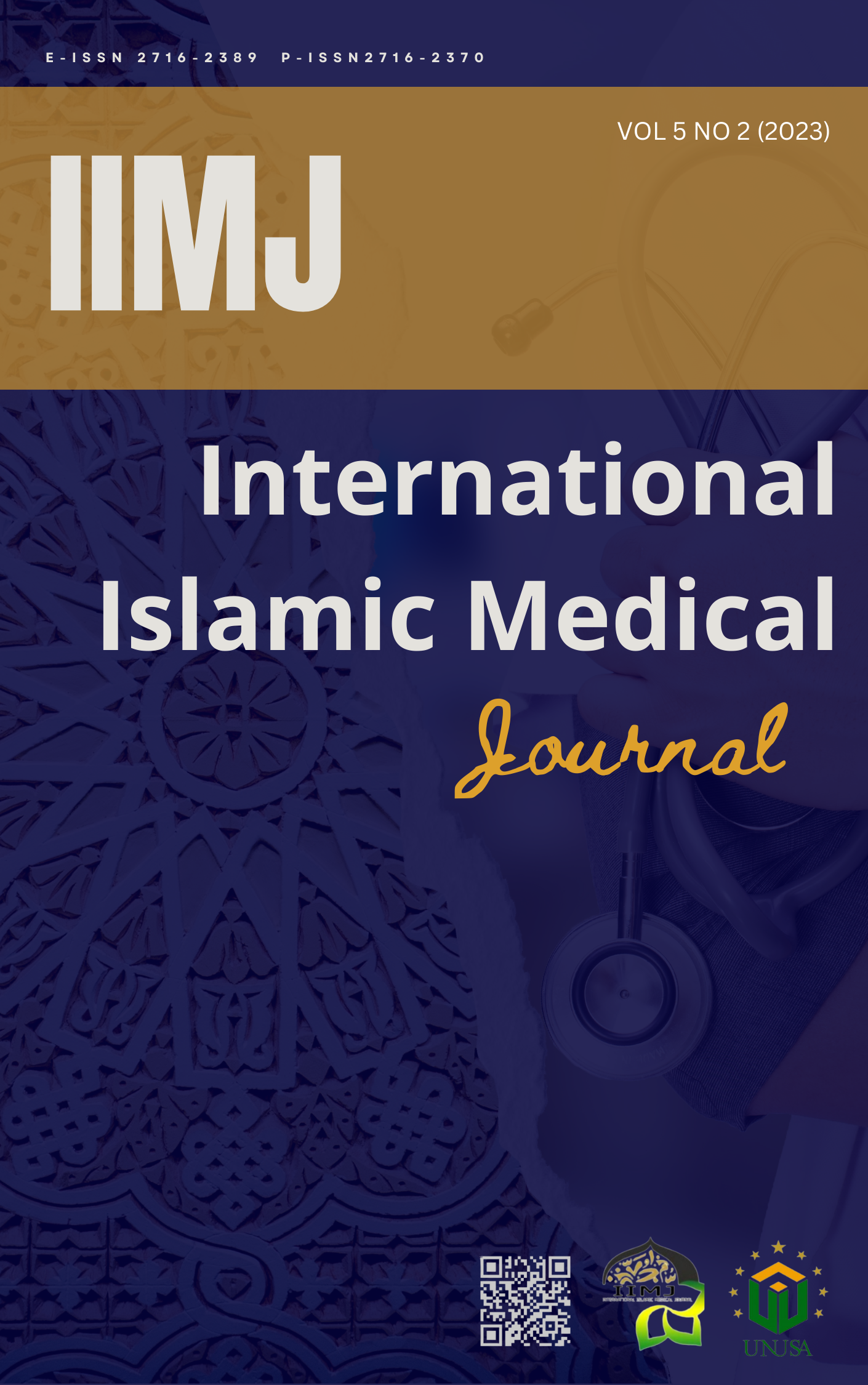Forensic Examination in Infanticide Case
Main Article Content
Abstract
Introduction: Infanticide is a crime in which a mother kills her baby during or shortly after birth. In 2020, infanticide cases in Indonesia reached 16.85%. Infanticide is mainly carried out through mechanical asphyxia in the form of smothering and strangulation.
Case: The body of an unidentified female newborn baby was found in the Sandubaya area, Mataram City, on Monday, July 10th 2023. The observation was carried out through external and internal examination of the body.
Discussion: There were bruises and peeling skin all over the body. The autopsy showed a haemorrhage all over the lower part of the scalp, severe injury to the neck, and blood seepage on the right chest.
Conclusions: The cause of death was due to severe neck injury resulting in asphyxia
Downloads
Article Details
Copyright (c) 2024 Hesa Chikita Putrie, Safira Mandasari

This work is licensed under a Creative Commons Attribution-ShareAlike 4.0 International License.
References
Afandi, D., Hertian, S., Atmadja, D. S., & Widjaja, I. R. (2008). Pembunuhan Anak Sendiri ( PAS ) dengan Kekerasan Multipel Infanticide with Multiple Injury- Case Report. MKI, 58(9), 355–359.
Amelinda, A., Hoediyanto, H., & Kalanjati, V. P. (2018). Profil Kasus Pembunuhan Anak di Departemen Ilmu Kedokteran Forensik dan Medikolegal RSUD Dr. Soetomo. EJKI, 6(1), 50–52. https://doi.org/10.23886/ejki.6.7214.Abstrak DOI: https://doi.org/10.23886/ejki.6.7214.
Ashari, Wahyuni, N. S., & Kusmiadi, M. E. (2023). Motif Kasus Pembunuhan Berencana Tinjauan Dinamika Psikologi Motive Of Planned Murder Case Review of Psychological Dynamic, 02(1), 1–25.
Atmoko, W. D., & Niufti, A. D. M. (2023). Infanticide: A Case Report. Jurnal Ilmiah Kohesi, 7(1), 1–5. Retrieved from https://kohesi.sciencemakarioz.org/index.php/JIK/article/view/374
Dekawati, G., & Marbun, W. (2022). Pendekatan Teori Criminal Thinking pada Kasus Pembunuhan Anak oleh Anak. Krisna Law: Jurnal Mahasiswa Fakultas Hukum Universitas Krisnadwipayana, 4(1), 59–67. Retrieved from https://doi.org/10.37893/krisnalaw.v4i1.15 DOI: https://doi.org/10.37893/krisnalaw.v4i1.15
Friedman, S. H., Horwitz, S. M., Ph, D., & Resnick, P. J. (2005). Reviews and Overviews Child Murder by Mothers : A Critical Analysis of the Current State of Knowledge and a Research Agenda. American Journal of Psychiatry, 162(9), 1578–1587. Retrieved from https://doi.org/10.1176/appi.ajp.162.9.1578 DOI: https://doi.org/10.1176/appi.ajp.162.9.1578
Khoiriah, A., & Pratiwi, T. (2019). Faktor-Faktor yang Berpengaruh terhadap Kejadian Asfiksia pada Bayi Baru Lahir. Jurnal’Aisyiyah Medika, 4. Retrieved from https://doi.org/10.36729/jam.v4i2.218. DOI: https://doi.org/10.36729/jam.v4i0.588
Langer, W. L. (1974). Infanticide : A Historical Survey. The Journal of Psychohistory, 1(3), 353.
Lonza, N. (2002). “ Two Souls Lost ”: Infanticide in The Republic Of Dubrovnik ( 1667-1808 ). Dubrovnik Annals, 39(6), 67–107. Retrieved from https://hrcak.srce.hr/18551
Ningsih, T., & Arafat, M. R. (2022). Ilmu Kedokteran Forensik Sebagai Ilmu Bantu dalam Penegakan Hukum Pidana di Indonesia. Widya Yuridika: Jurnal Hukum, 5(1), 157–164. Retrieved from https://doi.org/10.31328/wy.v5i1.2504 DOI: https://doi.org/10.31328/wy.v5i1.2504
Nur, A., & Yamamoto, Z. (2022). Saliva sebagai sumber DNA genom manusia. Jurnal Kedokteran Syiah Kuala, 22(2), 126–134. https://doi.org/10.24815/jks.v22i2.23266
Nurwatie, A., Fauzia, R., & Akbar, S. N. (2016). Perspektif Psikologi Humanistik Abraham Maslow dalam Meninjau Motif Pelaku Pembunuhan Perspective of Abraham Maslow’s Humanistic Psychology in Reviewing Motive of Murder. Jurnal Ecopsy, 1(4). Retrieved from http://dx.doi.org/10.20527/ecopsy.v1i4.503 DOI: https://doi.org/10.20527/ecopsy.v1i4.503
Oberman, M. (2001). Understanding infanticide in context: Mothers who kill, 1870-1930 and today. J. Crim. L. & Criminology, 92, 707. DOI: https://doi.org/10.2307/1144241
Overpeck, M. D., Benner, R., Trumble, A., Trifletti, L., & Berendes, H. (1998). Risk factors for infant homicide in the United States. New England Journal of Medicine, 339(17), 1211–1216. Retrieved from 10.1056/NEJM199810223391706 DOI: https://doi.org/10.1056/NEJM199810223391706
Pradhika, P. (2011). Kajian Yuridis Kesesuaian Alat Bukti Keterangan Terdakwa dengan Visum Et Repertum (Studi Kasus Pembunuhan dengan Modus Asfiksia Nomor Register Perkara: PDM-43/KNYAR/Ep. 1/0309). SURAKARTA.
Radja, J. J., Saragih, R., & Henok, A. H. (2023). Analisis Yuridis Penegakan Hukum dan Keadilan dalam Tindak Pidana Pembunuhan Anak yang Baru Lahir Oleh Seorang Ibu. Honeste Vivere, 33(2), 185–198. Retrieved from https://doi.org/10.55809/hv.v33i2.255 DOI: https://doi.org/10.55809/hv.v33i2.255
Shkrum, M. J. (2007). Forensic Pathology of Trauma. Canada: Humana Press. DOI: https://doi.org/10.1007/978-1-59745-138-3
Sulmustakim, A. (2021). Kedudukan Psikologi Forensik dalam Penanganan Pelaku Tindak Pidana Pembunuhan dengan Kekerasan terhadap Anak. Journal of Law (Jurnal Ilmu Hukum), 6(1), 86–98.
Susanti, R. (2012). Kematian Tahanan Di Ruang Sel Polisi Kontroversi Pembunuhan atau Bunuh Diri Dilihat dari Sudut Pandang Ilmu Kedokteran Forensik. Majalah Kedokteran Andalas, 36(1), 112–120. Retrieved from 10.22338/mka.v36.i1.p113-120.2012 DOI: https://doi.org/10.22338/mka.v36.i1.p113-120.2012
Susilaningsih, T. (2004). Bentuk dan Upaya Penangangan Kekerasan pada Anak. Perspektif, 9(1), 62–77. Retrieved from 10.30742/perspektif.v9il.264 DOI: https://doi.org/10.30742/perspektif.v9i1.264
Tantimin, Febriyani, E., & Putra, D. (2023). Tinjauan Putusan 18 / Pid . Sus-Anak / 2020 Pn Unh Terkait Kinderdoodslag Oleh Anak di Bawah Usia dalam Kontekstual Tindak Pidana Pembunuhan. Journal Of Social Science Research, 3(4), 7010–7024. Retrieved from https://doi.org/10.31004/innovative.v3i4.4153
Väli, M., Lang, K., Soonets, R., Talumäe, M., & Grjibovski, A. M. (2007). Childhood deaths from external causes in Estonia , 2001 – 2005. BMC Public Health, 7, 1–7. https://doi.org/10.1186/1471-2458-7-158 DOI: https://doi.org/10.1186/1471-2458-7-158

